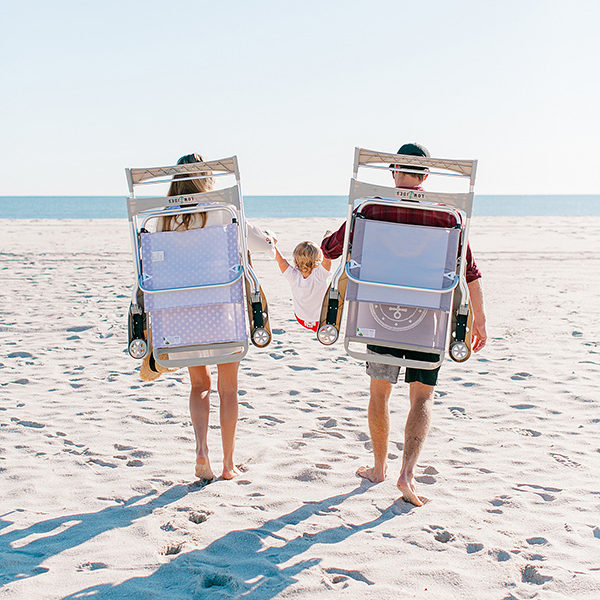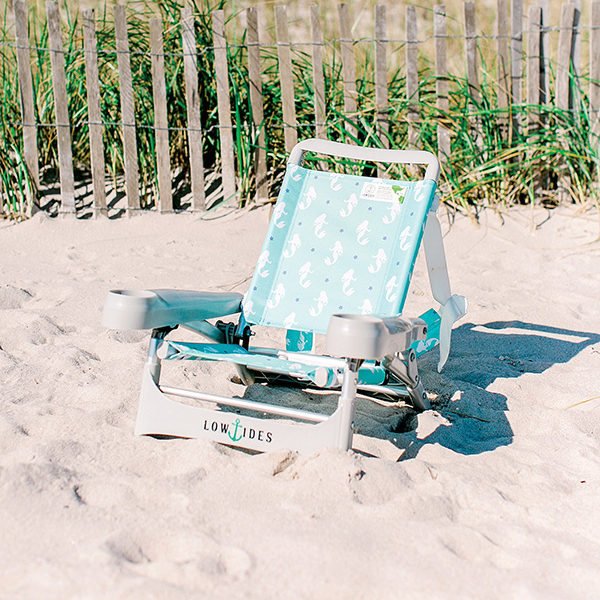
By Elizabeth Wulfhorst
RED BANK – The beach is in Brenton Hutchinson’s blood. “I was born Memorial Day weekend back in 1984 and I think I was at the beach three weeks later,” he said. He grew up spending every summer weekend with a large extended family at a “typical New Jersey shore house” in Sea Isle City.
Although his day job is in commercial real estate, Hutchinson, a Red Bank resident and married father of four, said he “grew up in an entrepreneurial family.” His father runs his own business and his grandfather started his own HVAC business in South Jersey. He said with the rise of e-commerce, it is easier than ever to “bring a product to life.”
In 2018, he was “down the shore” and happened to pick up a National Geographic magazine that was lying around the house. That issue, he said, focused on the growing problem of plastics and other waste in the world’s oceans, which he said he knew existed, but “until you read that edition you have no idea. So that kind of opened my eyes up to the real problem.”
He spent the weekend staring at the ocean and brainstorming ideas and he kept thinking about the organizations that were cleaning the garbage from the water. “Instead of it just going into a landfill, what if we could do something with it?” he thought. “What if we could reuse it?”
Hutchinson noted that most people throw their recycling in a bin and hope it ends up as a new water bottle or aluminum can. He set out to make sure recycling would actually happen by using the waste to create a new product. But he still didn’t have an idea what that product would be.
Now, the basic mechanics of the folding beach chair have been around for decades. But as Hutchinson looked around the beach that afternoon he saw hundreds of brightly colored plastic chairs and thought, “You know what? I’m not a fan of my beach chair.”
“It takes a rocket scientist to close that thing,” he said. His cup holder was broken and the pattern on the chair wasn’t his style. He shared his idea of using recycled plastic waste from the ocean to build a better beach chair with his family that night. He said they loved the concept, but now the question became how to make it a reality.
The main thing you need to create a new product is “grit,” he said. “I had no idea what (road) I was going down.” It turns out it’s really hard to make a beach chair, especially one made of recycled ocean plastic that is as good as or better than any chair already on the market.
First he hired an engineer to help him design a chair. Then he had to find a manufacturer. “I was designing my beach chair and running a parallel path of finding a factory to create what I was designing,” Hutchinson said. By listening to many podcasts he said he found a company to help him secure a manufacturer in Asia to make the chair he was designing.
He launched a Kickstarter campaign in June 2019 – a year after he first came up with the idea – and raised $30,000. (Hutchinson doesn’t have any investors; he is mainly the one bankrolling the company.) But even more so than the money, Hutchinson said he came away from the Kickstarter campaign with “market viability. People were interested in the idea, the concept, the look.”
Then he started building a business, not just a beach chair. LowTides Ocean Products now had a website and, when he needed a team, he turned to LinkedIn and family. His sister is the director of marketing, handling the company’s social media, email outreach, photo shoots and more. A friend who is a tax accountant is now the CFO.
But by fall 2019, Hutchinson realized there was no way he could get the beach chairs to the Kickstarter investors on the timeline promised. “I had no idea how long it was going to take to build a product,” he said.

One of the main problems he was having was sourcing the plastic. “You can’t Google it and it’s a phone call away to be able to find this plastic waste. There’s only a certain amount of companies out there that have this type of raw material,” he said.
“After many, many, many phone calls, black holes, emails,” Hutchinson connected with Envision Plastic in North Carolina, a company he said “really believes in this type of sustainability.” He traveled to the Yucatán Peninsula to see exactly how the plastic was being harvested and to “feel comfortable that what we were selling was exactly what we were, you know, marketing to our followers,” he said.
He traveled to China in October 2019, met with an agent and toured a factory, only to be told at the end of the trip the factory wasn’t suitable for their needs. So he found another factory.
Then the pandemic hit.
Factories shut down. “It was weird. I knew what was going on in the world before everybody else. I was working with China on an almost daily basis at that point,” he said. It was hard to wrap his mind around what was happening. When he was told the factory workers wouldn’t be coming back after the break for Chinese New Year, he said, “What do you mean they’re not coming back?”
When factories did reopen, PPE became the priority. “I had no idea at the time what this was going to end up being,” he said about the COVID-19 crisis. “But I have people that have ordered these chairs and they’re asking me where their chairs are and we’re changing the factories and I got a worldwide pandemic on my hands.”
In July 2020, Hutchinson said they were finally able to start delivering the product to those who ordered through the Kickstarter campaign and pre-orders they had accepted on the website. But the company took yet another hit when Hutchinson realized there was a small issue with a component on the chairs not being as strong as it should have been. “So we had to recall the chairs, Day One,” he said. They had shipped around 400 chairs.
“We went through our first recall process the first week that we launched.” Hutchinson laughingly called it a “labor of love at this point.”
He said after all the setbacks he did consider shuttering the business, but “I’ve learned through commercial real estate there’s ebbs and flows and peaks and valleys,” he said and he was confident in his product. Hutchinson knew if he could get through these valleys, customers would buy his beach chairs.
He said the experience forced them to be better. “We sold out of our low chairs and kids chairs last summer, which was awesome,” he said, and in August 2020 went almost back to square one, finding a new designer, a new engineer, a new agent and a new factory. “After the experience, I knew what I had to do to make a better product and to better our brand,” Hutchinson said.
They now work with Ocean Works and plastic for the chairs comes from Indonesia which gives LowTides a smaller carbon footprint and makes the process of getting the plastic to the Chinese factories easier. When sourcing from the Yucatán, the waste was shipped to Los Angeles, and then had to be sent to China. Ocean Works confirms that the plastic being used is collected from coastal waters to uphold the LowTides original mission.
For those who may question why the company sources plastic from so far away, Hutchinson explained, “There’s currents, so whether it comes from New Jersey or it comes from the Yucatán Peninsula or it comes from Indonesia, it directly impacts us.”
The LowTides chairs weigh about 7 pounds; upcycled plastic material accounts for 2 pounds of that. The next iteration of chairs will also include recycled polyester fabric, something that wasn’t logistically possible during the pandemic.
During LowTides’ first season, they created and shipped 2,500 chairs to their warehouse in the United States. They quadrupled production for 2021. The Dune Tall beach chairs, which retail for $109.99 are nearly sold out. The Sandbar Low beach chairs, $139.99, are in stock, including a special whale wave pattern chair for $149.99 in collaboration with Massachusetts artist Molly Hatch. Children’s chairs are available in a variety of patterns from $89.99 to $94.99.
As they get ready to enter the fourth year in business, Hutchinson said he can “personally tell you that we’ve taken 16,000 pounds of plastic out of the environment and we reused it, rather than it sitting in a landfill for the next 500 years.”
That definitely sounds like a better beach chair.
The article originally appeared in the May 27 – June 2, 2021 print edition of The Two River Times.














